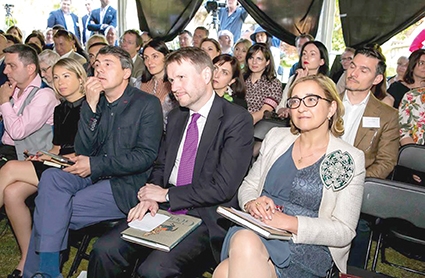UK Celebrates 100 Years of Georgia
Saturday May 19 was a particularly significant date for the United Kingdom; not only was there a major event which sent ripples through the national consciousness, finding its outlet in an intense outpouring of patriotism and country-wide celebration (in the end Chelsea beat Manchester United 1-0), but apparently some bloke with a beard married that actress off Suits which was pretty big news too. Deep in darkest Kent, however, away from the football and the Royal Wedding, there was another celebration of a rather lesser-known but historically significant event, held at the house of the late Sir Oliver Wardrop: the centenary of the First Georgian Republic.
There is a tendency for Georgia-related events here to have a sense of having been thrown together much in the manner of a late-night dinner; chucking whatever’s left in the fridge together in a pan in the hope of an edible result. Sometimes it’s a disappointment, but occasionally one ends up with something intriguing, confusing on the surface, but ultimately somehow harmonious. This celebration was the latter. Lectures covering different areas of the tragically short-lived republic and its subsequent influence were broken up by readings from The Knight in the Panther’s Skin, a musical interlude from soprano Lali Chilaia, the reading of letters between Marjory Wardrop and Ilia Chavchavadze by pupils from the First Georgian Supplementary School, and a break for tea and cake. At first, I thought this last was a sop to our quaint English village surroundings, but of course the cakes were made according to Georgian recipes and the tea was Gurieli.
I’m not joking when I compare the seminar with bubble and squeak: Professor Donald Rayfield – stalwart of all things Georgia – talked about the contributions from and characters of two English scholars of Georgia: William Edward David Allen and David Marshall Lang. A curious duo, Allen was from a wealthy family and had the leisure of following his interests wherever they led him. After a spell as a war correspondent during the Greco-Turkish War, he became a noted scholar on Transcaucasia, leaving a huge collection of research pertaining to the area when he died. His reputation was marred by his association with Oswald Mosley and the British Union of Fascists, although evidence has emerged that he may have been an MI5 informant. Lang was another peculiar figure, a brilliant scholar whose writings on the region have been invaluable to future researchers, but a friend of Inauri’s and someone whose reputation appears to have been compromised through association with the KGB. Gillian Evison gave a technical talk on the numerous efforts expended on cataloguing and collating Georgian historical documents at the Bodleian and British Libraries (putting my meagre day job managing a small lending-library into stark perspective!), whilst Nikoloz Aleksidze entertainingly plugged Georgia: A Cultural Journey Through the Wardrop Collection, a book intended for people like me; not too academic (read ‘bright’) but interested in the history.
Most affecting though were the lectures from author and historian Eric Lee, novelist Dato Turashvili, and Dr. Beka Kobakhidze. Lee enthused over the idea that the First Georgian Republic proves that a democratic socialist revolution is possible and argued for its wider significance with reference to its effect on Ramsay MacDonald and the British labor movement; Turashvili remarked touchingly on difficulties faced after the Soviets took over, and the strange internal dichotomy felt by people such as he who experienced both the scourge of Soviet communism and the mixed blessing of successive liberalization. Kobakhidze explained that Oliver Wardrop’s important contributions to the Georgian story have been frequently eclipsed by those of his sister Marjory (redoubtable though she was) and that his significance is only just starting to become apparent, having been ‘covered up by Soviet historiography’.
Taken together, there was a common theme running through the day: after the enforced ignorance of Soviet rule, Georgians are still enduring the arduous task of rediscovering and learning from their time before that appalling 70-year limbo, but the seeds are germinating and will hopefully flourish, given the right support. Justin McKenzie Smith, the British Ambassador to Georgia, rounded off the speeches with reference to the United Kingdom and Georgia’s “rock-solid relationship with a single worldview based on friendship.”
If that statement is to have practical, real-world significance, then the relationship has to come from the bottom up. Politicians frequently wax lyrical about ‘deep and meaningful relationships’ or ‘deep and comprehensive partnerships;’ cotton wool words which mean nothing in themselves and can bring the frothing inner cynic out of the most meek and gentle soul. But if there is a will to cooperate, then events like these are a good way to start.
There is a fund which has been set up to help the translation of Georgian non-fiction to English which this seminar was in aid of. Search www.mydonate.bt.com/charities/farig to support it.
By Robert Edgar











